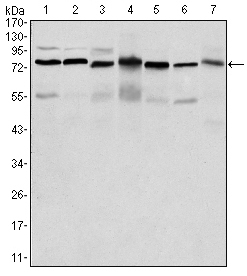PSIP1 Antibody - #BF0218
Product Info
*The optimal dilutions should be determined by the end user. For optimal experimental results, antibody reuse is not recommended.
*Tips:
WB: For western blot detection of denatured protein samples. IHC: For immunohistochemical detection of paraffin sections (IHC-p) or frozen sections (IHC-f) of tissue samples. IF/ICC: For immunofluorescence detection of cell samples. ELISA(peptide): For ELISA detection of antigenic peptide.
Cite Format: Affinity Biosciences Cat# BF0218, RRID:AB_2833877.
Fold/Unfold
CLL associated antigen KW 7; CLL-associated antigen KW-7; Dense fine speckles 70 kDa protein; DFS 70; DFS70; LEDGF; Lens epithelium derived growth factor; Lens epithelium-derived growth factor; MGC74712; p52; p75; PAIP; PC4 and SFRS1 interacting protein 1; PC4 and SFRS1 interacting protein 2; PC4 and SFRS1 interacting protein; PC4 and SFRS1-interacting protein; PSIP 1; PSIP 2; Psip1; PSIP1_HUMAN; PSIP2; Transcriptional coactivator p75/p52;
Immunogens
Purified recombinant fragment of human PSIP1 expressed in E. Coli.
Widely expressed. Expressed at high level in the thymus. Expressed in fetal and adult brain. Expressed in neurons, but not astrocytes. Markedly elevated in fetal as compared to adult brain. In the adult brain, expressed in the subventricular zone (SVZ), in hippocampus, and undetectable elsewhere. In the fetal brain, expressed in the germinal neuroepithelium and cortical plate regions.
- O75475 PSIP1_HUMAN:
- Protein BLAST With
- NCBI/
- ExPASy/
- Uniprot
MTRDFKPGDLIFAKMKGYPHWPARVDEVPDGAVKPPTNKLPIFFFGTHETAFLGPKDIFPYSENKEKYGKPNKRKGFNEGLWEIDNNPKVKFSSQQAATKQSNASSDVEVEEKETSVSKEDTDHEEKASNEDVTKAVDITTPKAARRGRKRKAEKQVETEEAGVVTTATASVNLKVSPKRGRPAATEVKIPKPRGRPKMVKQPCPSESDIITEEDKSKKKGQEEKQPKKQPKKDEEGQKEEDKPRKEPDKKEGKKEVESKRKNLAKTGVTSTSDSEEEGDDQEGEKKRKGGRNFQTAHRRNMLKGQHEKEAADRKRKQEEQMETEQQNKDEGKKPEVKKVEKKRETSMDSRLQRIHAEIKNSLKIDNLDVNRCIEALDELASLQVTMQQAQKHTEMITTLKKIRRFKVSQVIMEKSTMLYNKFKNMFLVGEGDSVITQVLNKSLAEQRQHEEANKTKDQGKKGPNKKLEKEQTGSKTLNGGSDAQDGNQPQHNGESNEDSKDNHEASTKKKPSSEERETEISLKDSTLDN
Research Backgrounds
Transcriptional coactivator involved in neuroepithelial stem cell differentiation and neurogenesis. Involved in particular in lens epithelial cell gene regulation and stress responses. May play an important role in lens epithelial to fiber cell terminal differentiation. May play a protective role during stress-induced apoptosis. Isoform 2 is a more general and stronger transcriptional coactivator. Isoform 2 may also act as an adapter to coordinate pre-mRNA splicing. Cellular cofactor for lentiviral integration.
Citrullinated by PADI4.
Nucleus.
Note: Remains chromatin-associated throughout the cell cycle.
Widely expressed. Expressed at high level in the thymus. Expressed in fetal and adult brain. Expressed in neurons, but not astrocytes. Markedly elevated in fetal as compared to adult brain. In the adult brain, expressed in the subventricular zone (SVZ), in hippocampus, and undetectable elsewhere. In the fetal brain, expressed in the germinal neuroepithelium and cortical plate regions.
Belongs to the HDGF family.
Restrictive clause
Affinity Biosciences tests all products strictly. Citations are provided as a resource for additional applications that have not been validated by Affinity Biosciences. Please choose the appropriate format for each application and consult Materials and Methods sections for additional details about the use of any product in these publications.
For Research Use Only.
Not for use in diagnostic or therapeutic procedures. Not for resale. Not for distribution without written consent. Affinity Biosciences will not be held responsible for patent infringement or other violations that may occur with the use of our products. Affinity Biosciences, Affinity Biosciences Logo and all other trademarks are the property of Affinity Biosciences LTD.
